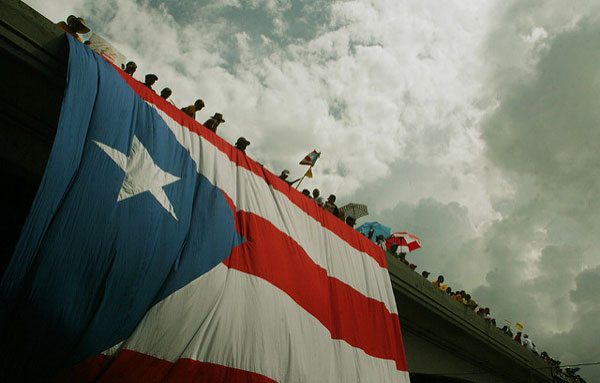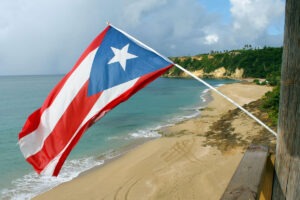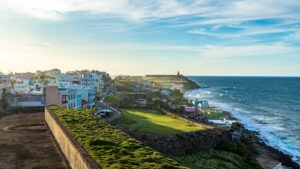
Nonprofits and activists often find themselves in the position of responding to disasters heaped upon slower moving injustices. This quandary is distressingly evident in stateside organizers’ work to address the problems in Puerto Rico post-Maria. By now, most of us have heard the numbers on the humanitarian crisis in Puerto Rico resulting from Hurricane Maria, a Category 4 storm that directly hit on September 20th, its eye covering the entire the island. But the island’s emergency started long before the storm hit, and some advocates are suggesting this is a moment when serious investment in the so-called territory’s future is in order.
Many are calling the situation in Puerto Rico apocalyptic. Phil McKenna writes for Inside Climate News, “Puerto Rico is, in many ways, a microcosm for climate fairness issues at the global level…[it] is quickly becoming a poster child for a problem that spans the globe; the disproportionate impacts of climate change risks on the poor, vulnerable and especially colonial and island nations.”
As Yarimar Bonilla writes for the Washington Post, “One peculiarity of this year’s hurricane season is that many of the societies that have been hit are not sovereign nations but rather places with diverse and shifting arrangements with their colonial centers.”
While Trump’s comments remove the current Puerto Rican crisis from its historical context, Bonilla implicates the U.S. when she writes,
Places like Puerto Rico also provide important economic cover for their colonial centers. Cheaper labor pools, lax environmental protections and economic loopholes make them attractive sites for speculative investment, money laundering and tax evasion. Indeed, it was Puerto Rico’s unique ability to issue triple tax-exempt bonds—subject to neither state, federal nor municipal tax—which made it so irresistible to U.S. investors, leading in no small part to the current crisis.
She concludes that, “Vulnerability is not simply a product of natural conditions; it is a political state and a colonial condition.”
CityLab’s Kriston Capps writes, “The deepening humanitarian crisis in Puerto Rico reveals a disaster response that is categorically different from the actions taken in the wake of hurricanes that struck the continental U.S. recently.”
The money pledged for disaster relief spending by the Trump administration following the recent storms will go first to Texas and Florida, both states that voted for Trump, while Puerto Rico has no vote and therefore no representation in negotiations over relief money. McKenna reports that Jenniffer González, Puerto Rico’s non-voting representative in Congress tweeted, “There needs to be a consideration of how we balance those allocations, to meet the needs of those who are most vulnerable.”
But some say allocating rebuilding money fairly isn’t enough; the island has to rethink its energy strategy. Otis Rolley, North American regional director for 100 Resilient Cities, said,
This rebuilding period could be a chance to holistically rethink Puerto Rico’s resiliency infrastructure, taking a cue from some of the lessons learned (or bungled) in New York and New Orleans after Hurricanes Sandy and Katrina.
After those respective storms, Rolley says, the cities “changed their zoning codes, their construction codes, and even how they connected individuals with each other in terms of strengthening social cohesion.” Following disasters, he adds, “both a physical infrastructure and a human one helps them to reduce the loss of lives, and decrease recovery time.”
Judith Enck, the former EPA administrator for Region 2, which includes Puerto Rico and the U.S. Virgin Islands, says, “It’s absolutely imperative that FEMA not fund rebuilding an inadequate system.” Puerto Rico’s energy infrastructure relied on coal and oil, “unreliable and unsustainable power sources.” Its residents paid some of the highest rates in the country for that energy.
Jose Fuentes, chairman of the Puerto Rico Statehood Council, agrees. “You can’t just fix what is there now. It needs to be rebuilt from the ground up.”
This distinction is important and something for which to advocate because, according to Enck, “FEMA typically only permits disaster relief funding to go toward rebuilding what was damaged—not to rethink it from the ground up.” There are models for this; Enck points to Hawaii, “where utility providers have outlined a blueprint for moving toward a grid backed solely by green energy.”
There have been more than 4,000 natural disasters in the Caribbean since 2003, up from fewer than 100 “over a similar period at the beginning of the 20th century.” And, McKenna wrote that according to the latest National Climate Assessment, “The number of the strongest storms, Category 4 and 5 hurricanes, will likely increase over the coming century.” Christina Chan, climate resilience practice director for the World Resource Institute and former branch chief for the U.S. State Department’s climate change office, said, “This is the new norm. How do we start building that into the bloodstream of our economic, social and development work, whether you are talking domestic or international?”
Meanwhile, in the midst of all of these longer term concerns, many local organizers are busy trying to manage immediate relief efforts. NPQ talked to stateside Puerto Rican leaders about what they were hearing and doing. We are learning that, as with many other challenges, local leaders are stepping in to do what the federal government will not.
Nelson Roman
Nelson Roman is executive director of Nueva Esperanza in Holyoke, Massachusetts, and City Councilor for Ward 2. According to the Census, Holyoke has a high concentration of Puerto Ricans at 35.5 percent. Roman, who has been working with the National Puerto Rican Agenda for the past two years on the island’s fiscal crisis, said, “It’s a waiting game. Our effort and focus is on the most immediate impact and that’s financial. We’ve opened up a relief fund so that we don’t have to work with FEMA or the Red Cross.”
Sign up for our free newsletters
Subscribe to NPQ's newsletters to have our top stories delivered directly to your inbox.
By signing up, you agree to our privacy policy and terms of use, and to receive messages from NPQ and our partners.
Roman is co-chair of the Western Mass United for Puerto Rico Coalition, comprising politicians, nonprofit leaders, and community stakeholders. He described the coalition’s three-pronged strategy.
We are collecting goods for now, but, after the 1st or 2nd of October, we’re shifting the focus to financing, or sending money to the island. The money will be there before the goods and services. When the goods hit the island, only FEMA can release them and that takes days. The last component is the migration of Puerto Ricans coming to stay with their friends and family, either in transition or to stay permanently. We as a community are having a strategic conversation with the school system to relieve immunization and identification requirements so children from Puerto Rico can get into schools right away. We’re also coordinating with nonprofits so that they can handle the needs of these individuals.
The coalition has a counterpart in Connecticut led by Jason Ortiz, also of National Puerto Rican Agenda. Eastern, Massachusetts started its own coalition last week with an inaugural meeting at Inquilinos Boricuas en Acción (Puerto Rican Tenants in Action).
Amaad Rivera
Amaad Rivera, state policy director for Senator Ed Markey and, like Roman, a member of Western Mass United for Puerto Rico, says:
This situation has a unique impact in Massachusetts. Holyoke has the highest concentration of Puerto Ricans in the U.S. and the fastest growing among people of color. So, we were already checked into this. The irony is that, as a community of Puerto Ricans, we’re not usually this coordinated. This is unprecedented for Western Massachusetts. We’re not just having meetings; we’re inventorying relief efforts, bringing communities together to raise money. We’re meeting tomorrow to coordinate the state’s response to health care, child care, food access, housing, elderly care, education, language. We’re already at that stage because some Puerto Ricans are already bringing family back.
At first, the only way to get things in was through the military. But to do that, you have to go through an application process. The only organization I know in the state or the region that applied was Nueva Esperanza. We did that just in case nothing else worked out. If there’s commercial availability, we’d pursue that. The government can’t say no to commercial entities. So, we started to listen to who was willing. JetBlue just got approval from FEMA to fly, so we introduce them to organizations in that area trying to move materials in as they fly people out. Some people are going there to get family. I have a friend who flew out yesterday to get his mother out.
We have members who have partnerships with local municipalities which are helping us to get money in. One coalition member used to work for a mayor in Puerto Rico. Most likely, the Puerto Rican counterpart will designate a bank to which we send the money, and they would distribute the funds locally.
Finally, we’re getting ready for the refugees, migrants, emigrants…I don’t know what they’d call them. They’re probably going to the cities with the largest Puerto Rican populations: Chicago, Springfield, Boston, Hartford, New York, and Florida. We’re turning to how to coordinate between governments and nonprofits on dealing with the influx, which will be adding an extra economic burden to families that may already be limited. The next step is figuring out how to make sure it’s funded appropriately.
Elizabeth Yeampierre
Elizabeth Yeampierre, executive director of Uprose in Brooklyn and co-chair of both the Climate Justice Alliance and the Grassroots Global Justice Alliance, says:
There are going to be more extreme weather events. Climate change is here. There’s no denying that. This is going to happen harder and faster, so any rebuild has to be sustainable and regenerative. The entire economy has to be built in regenerative energy and local economic livability.…How do we keep an eye on the rebuild so we don’t end up in a worse station for our sovereignty?
An influx of Puerto Ricans from the island to the mainland means new voters, since Puerto Ricans who can’t vote in U.S. elections on the island will be able to do so once they are living in the States. Rivera agreed. He said, “This can help swing an election, especially locally.”
This crisis offers an opportunity to not just rebuild a more sustainable Puerto Rican economy but to fundamentally change the political relationship between Puerto Rico and the United States. Last week, Nelson A. Denis wrote about just one aspect of the political chains on the island, in “The Law Strangling Puerto Rico.”
This is a shakedown, a mob protection racket, with Puerto Rico a captive market. The island is the fifth-largest market in the world for American products, and there are more Walmarts and Walgreens per square mile in Puerto Rico than anywhere else on the planet.
A 2012 report by two University of Puerto Rico economists found that the Jones Act caused a $17 billion loss to the island’s economy from 1990 through 2010. Other studies have estimated the Jones Act’s damage to Puerto Rico, Hawaii and Alaska to be $2.8 billion to $9.8 billion per year. According to all these reports, if the Jones Act did not exist, then neither would the public debt of Puerto Rico.
[…]
This is not just about recovering from Hurricane Maria. It is also about Puerto Rico’s long-term future. If the Jones Act were suspended, consumer prices would drop by 15 percent to 20 percent and energy costs would plummet. A post-Jones Puerto Rico could modernize its infrastructure and develop its own island-based shipping industry. Indeed, the island could become a shipping hub between South America, the Caribbean and the rest of the world. This industry would generate thousands of jobs and opportunities for skilled laborers and small businesses. On an island with official unemployment over 10 percent (but actually closer to 25 percent), this would energize their entire work force.
So, as is too ordinary for nonprofits, we have disaster heaped on top of injustice writ large in Puerto Rico. Maybe it’s time for the nonprofit sector and philanthropy to consider how to help make this a passing-gear moment.—Cyndi Suarez













